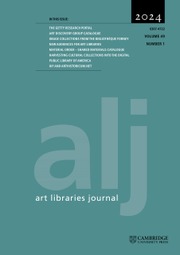Article contents
Reading the archive against the grain: Power relations, affective affinities and subjectivity in the documenta Archive
Published online by Cambridge University Press: 10 July 2020
Abstract
In this article, the documenta Archive is read ‘against the grain’, that is, not in search for art-historically relevant information, but, instead, so as to find traces of subjective biases in its structure and/or emotional contents in its records. The aim of this exercise is to examine the subjective nuances in the archival structure, which every archive preserves even if these are not intentionally recorded. These nuances provide glimpses into an intellectual construction that is otherwise hidden.
- Type
- Research Article
- Information
- Copyright
- Copyright © ARLIS, 2020
References
1. Burton, Antoinette, “Introduction: Archive Fever, Archive Stories.” In Burton, Antoinette (ed.), Archive Stories: Facts, Fictions and the Writing of History. Durham, NC: Duke University Press, 2005. 1–24CrossRefGoogle Scholar.
2. Based on a definition by Robert Masters, Kelly Jacob Rawson points out that “affect” is “an evaluative sensation, that may or may not be conscious; feeling is affect that is cognitively processed and evaluated; and emotion is the social dramatization of feeling.” See Kelly Jacob Rawson, Archiving Transgender: Affects, Logics, and the Power of Queer History (2010). Syracuse University Writing Program – Dissertations. 1, p. 219. (https://surface.syr.edu/wp_etd/1) For the purpose of this essay, however, these terms are considered to be synonyms.
3. Kelly Jacob Rawson, ibid., p. 216.
5. Letter from Harald Szeemann to the documenta finance manager, March 9, 1972. Mrs. Grüterich was at the time the director of the documenta Archive.
6. Letter from Harald Szeemann to the documenta finance manager, October 4, 1970.
7. Fax from Harald Szeemann to Alexander Farenholtz, March 1, 1994.
8. Letter from Harald Szeemann to Alexander Farenholtz, December 27, 1993.
9. Letter from Ela Spornitz to Jean-Christophe Ammann, July 7, 1971.
10. Letter from Jean-Christophe Ammann to Ela Spornitz, September 18, 1972.
11. Letter from Jean-Christophe Ammann to Ela Spornitz, January 4, 1973.
13. Genette, Gérard and Maclean, Marie, “Introduction to the Paratext”, in New Literary History, Vol. 22, No. 2, Probings: Art, Criticism, Genre (Spring, 1991), p. 261CrossRefGoogle Scholar.
14. Ibid.
- 4
- Cited by


